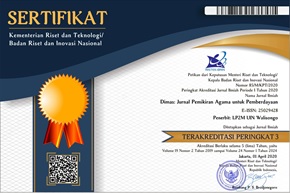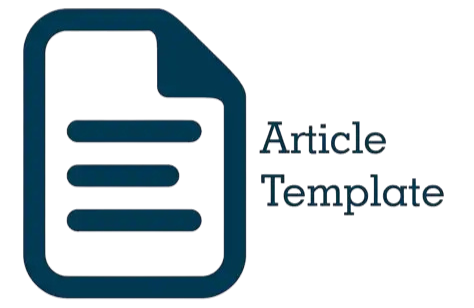Penguatan Jaringan Komunikasi LDK (Strategi Pemberdayaan Potensi Keberagamaan Warga di Banyumanik)
DOI:
https://doi.org/10.21580/dms.2017.171.1508Keywords:
Penguatan, komunikasi, kesadaran beragama.Abstract
This paper describes the strengthening of communication network of Community Da'wah Institution (LDK) as a strategy to empower the potential of religious residents in Banyumanik. This potential empowerment is aimed at the emergence of citizens' religious awareness, through the shifting of communication networks that are taking place in Banyumanik. Subjects consisted of four LDKs and one foundation. The method of devotion uses the principle of Participatory Rural Apraisal (PRA) with the Feminist approach. The results of the mentoring activities indicate that there is still a problem of religious awareness among residents in Banyumanik. Indication of religious awareness problem besides value system, indicated by the absence of consistency of behavior. Efforts are made to reduce the problem of religious awarenessDownloads
References
Aliyudin, dan Enjang As., Dasar-Dasar Ilmu Dakwah, Bandung: Widyapadjajaran, 2009
Aziz, Moh. Ali, Dakwah Pemberdayaan Masyarakat: Paradigma aksi Metodologi, Yogyakarta: LKiS, 2009
Bales, Robert F., dalam Juni Pranoto, Pengembangan Potensi Diri, Modul SPAMA, Jakarta: LAN, 2000
Berlo, David K., The Process of Communication An Intriduction to Theory and Practice, New York: Holt, Rinehart and Winston Inc., 1960
Gonzale, Hernando, Beberapa Mitos Komunikasi dan Pembangunan, Dalam A. Jahi (Penyunting), 1993, Komunikasi Massa dan Pembangunan Pedesaan di Negara-negara Dunia Ketiga Suatu Pengantar, Jakarta: PT Gramedia, 1993
Hadiati, Sri, dkk. , Perencanaan SDM: Pendekatan Praktis Perencanaan SDM, Jakarta: LAN RI, 2005
Hasanah, Hasyim, Peran Strategis Aktivis Perempuan Nurul Jannah Al Firdaus dalam Membentuk Kesadaran Beragama Perempuan Miskin Kota, Jurnal Inferensi, Vol. 7, No. 2, STAIN Salatiga, 2013
Hasanah, Hasyim, After Care Service Pasca Pengutan Menejemen LDK Masjid Perumahan dalam membangun Motivasi Spiritual dan Kesadaran Beragama Masyarakat, Laporan Karya Pengabdian Dosen, Lembaga Penelitian dan Pengabdian Masayarakat (LPPM) IAIN Walisongo Semarang, 2014
Hasanah, Hasyim, Analisis Difusi Jaringan Komunikasi Lembaga Dakwah Komunitas Masjid Dalam meningkatkan Kesadaran beragama Warga Perumahan, Laporan Penelitian, Fakultas Dakwah dan Komunikasi IAIN Walisongo, 2014
Hasanah, Hasyim, Microguiding dan Jaringan Komunikasi LDK Masjid (Strategi Pemberdayaan Potensi Keberagaman Warga Perumahan), Laporan Pengabdian, LPPM, UIN Walisongo, 2015
Hasanah, Hasyim, Penguatan Jaringan Komunikasi Lembaga Dakwah Komunitas (Strategi Pemberdayaan Potensi Keberagamaan Warga Urban di Banyumanik), Laporan KPD, LP2M Uin walisongo, 2016
Katz, E., Innovative Approaches to Finanching Extention for Agricultural and Natural Resources Management – Conceptual Conciderations Analysis of Experiences, (terj.), A. Barandun, LBL: Lindau, 2002
Knoke, Chaffee David and James Kulkinskni, Network Analysis Sistem. London: Sage Publication, 1982
Knoke, Chaffee David, dan Barberg, Network Analysis, London: Sage Publication, 1987
Korten, David C. (ed.), Community Management: Asia Experience and Perspective, (terj.), Conecticut: Kumarian Pers, 1987
Leeuwis, Cees, Komunikasi untuk Inovasi Pedesaan, Yogyakarta: Kanisius, 2009
Litereel, Donald W., The Theory and Practice of Community Development: A Guide for Practitioners, Harmonsorts: Pinguin Books, 1973
Mudzakir, M. Djauzi, Teori dan Praaktik Pengembangan Masyarakat, Surabaya: Usaha Nasional, 1986
Rogers, Everett, and Lawrence D. Kincaid, Communication Network Toward a New Paradigm for Research. New York: The Free Press, 1981
Setiana, Lucie, Teknik Penyuluhan dan Pemberdayaan Masyarakat, Bogor: Ghalia Indonesia, 2005
Soedjatmoko, Social Energy as a Development Resource, Community Management, Conecticut: Kumarian Press, 1986
Sumardjo, dkk., Transformasi Model Penyuluhan menuju Kemandirian Warga Masyarakat, Bogor: IPB, 2010
Surejo dalam Moh Ali Aziz, (ed.), Dakwah Pemberdayaan Masyarakat Paradigma Aksi Metodologi, Yogyakarta: LKiS Pelangi Aksara, 2009
Downloads
Published
Issue
Section
License
Copyright
The copyright of the received article shall be assigned to the journal as the publisher of the journal. The intended copyright includes the right to publish the article in various forms (including reprints). The journal maintains the publishing rights to the published articles. Therefore, the author must submit a statement of the Copyright Transfer Agreement.*)
Licensing

This work is licensed under a Creative Commons Attribution-ShareAlike 4.0 International License.
In line with the license, authors are allowed to share and adapt the material. In addition, the material must be given appropriate credit, provided with a link to the license, and indicated if changes were made. If authors remix, transform or build upon the material, authors must distribute their contributions under the same license as the original.
_______
*) Authors whose articles are accepted for publication will receive confirmation via email and send a Copyright Transfer Agreement.









